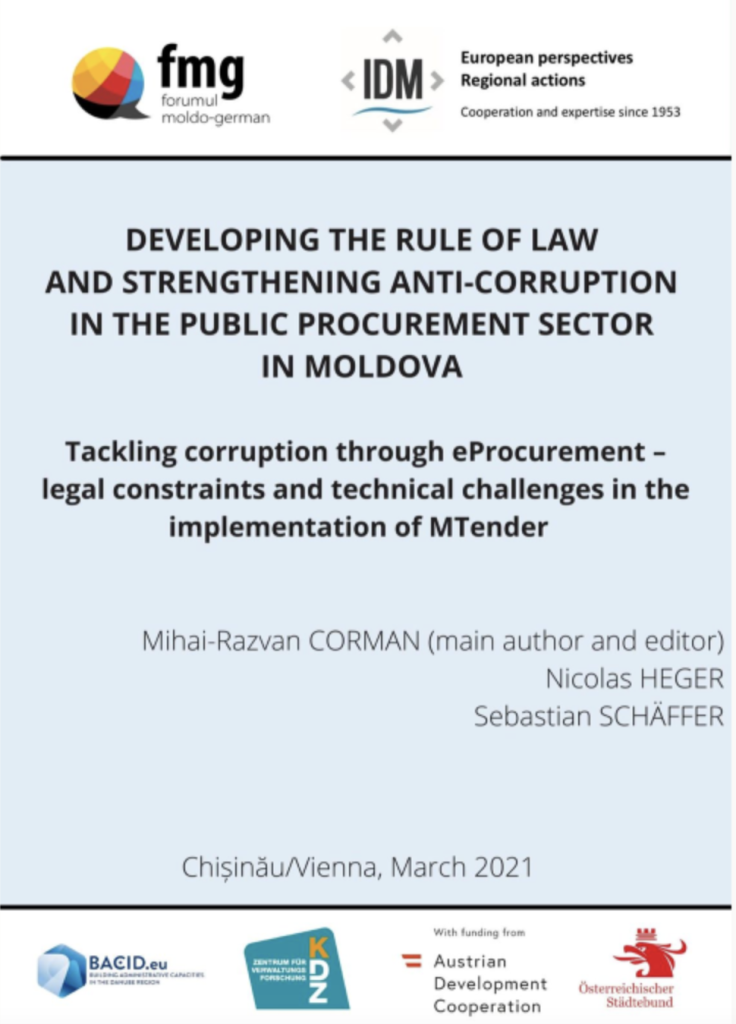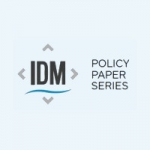DEVELOPING THE RULE OF LAW AND STRENGTHENING ANTI-CORRUPTION IN THE PUBLIC PROCUREMENT SECTOR IN MOLDOVA
Tackling corruption through eProcurement – legal constraints and technical challenges in the implementation of MTender
Mihai-Razvan CORMAN (main author and editor)
Nicolas HEGER
Sebastian SCHÄFFER
 Corruption in Moldova is endemic and widespread. Given the significant share of public spending in the Moldovan GDP, corruption in public procurement procedures is a particularly important issue. High levels of public procurement corruption hamper a competition-based, thriving and prosperity-generating market economy, have a significantly negative impact on the business and investment climate and present a serious obstacle to achieving the United Nations Sustainable Development Goals (UN SDGs). To counteract the devastating effects of corruption, in recent years, the use of electronic means in public procurement (eProcurement) has become a key instrument to increase transparency and accountability, reduce maladministration risks and strengthen businesses’ and citizens’ trust in public administrations. Against this backdrop, this study examines the legal constraints for the implementation of MTender – the eProcurement system in Moldova – and identifies the most up-to-date technical deficiencies of the system presenting challenges for its day-to-day use by the Moldovan business community.
Corruption in Moldova is endemic and widespread. Given the significant share of public spending in the Moldovan GDP, corruption in public procurement procedures is a particularly important issue. High levels of public procurement corruption hamper a competition-based, thriving and prosperity-generating market economy, have a significantly negative impact on the business and investment climate and present a serious obstacle to achieving the United Nations Sustainable Development Goals (UN SDGs). To counteract the devastating effects of corruption, in recent years, the use of electronic means in public procurement (eProcurement) has become a key instrument to increase transparency and accountability, reduce maladministration risks and strengthen businesses’ and citizens’ trust in public administrations. Against this backdrop, this study examines the legal constraints for the implementation of MTender – the eProcurement system in Moldova – and identifies the most up-to-date technical deficiencies of the system presenting challenges for its day-to-day use by the Moldovan business community.
This study argues that, despite significant improvements particularly in terms of transparency in public procurement in Moldova, MTender suffers from a variety of legal constraints hindering the system to unfold the full range of its functionalities as well as systeminherent technical deficiencies. The study shows that
(i) the Moldovan legal framework regulating MTender is incoherent and contradictory, non-compliant with EU requirements and creates barriers for economic operators,
(ii) MTender has technical limitations that need to be addressed to increase contracting authorities’ and economic operators’ user-friendliness and trust in the system
(iii) the degree of success of the establishment of a modern and digitalised public procurement system is highly dependent on the regulatory environment in which it operates and the community’s trust in its public institutions. Drawing on key experts’ and users’ assessments concerning the current state of the public procurement system in Moldova, this study offers some policy recommendations aimed at eliminating current legal constraints hampering the functioning of MTender and its systeminherent technical deficiencies. It suggests that a definite answer to whether MTender presents a viable instrument to enhance a functioning digitalised public administration in Moldova should follow a phase where the system operates at its full capacity.


